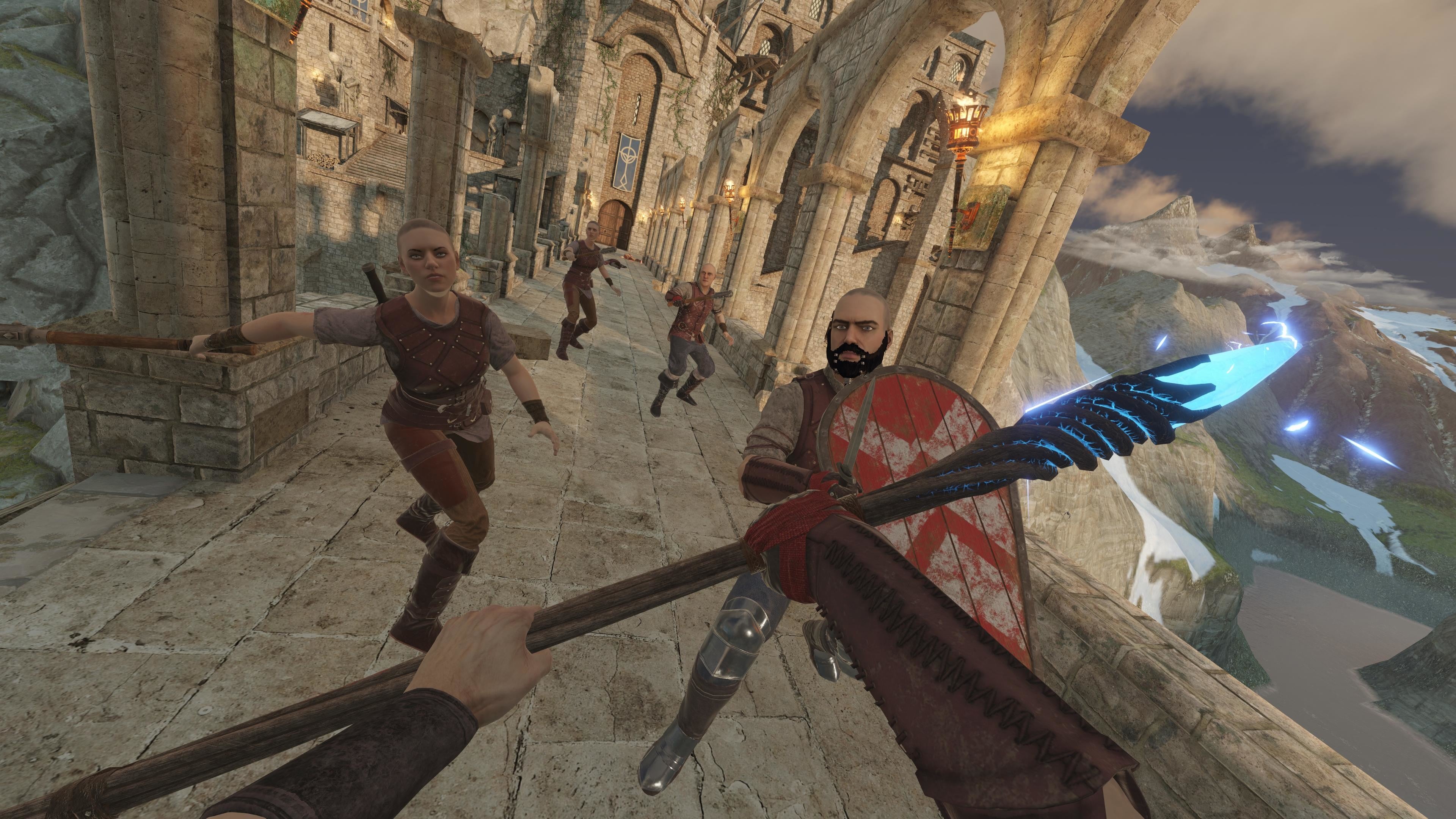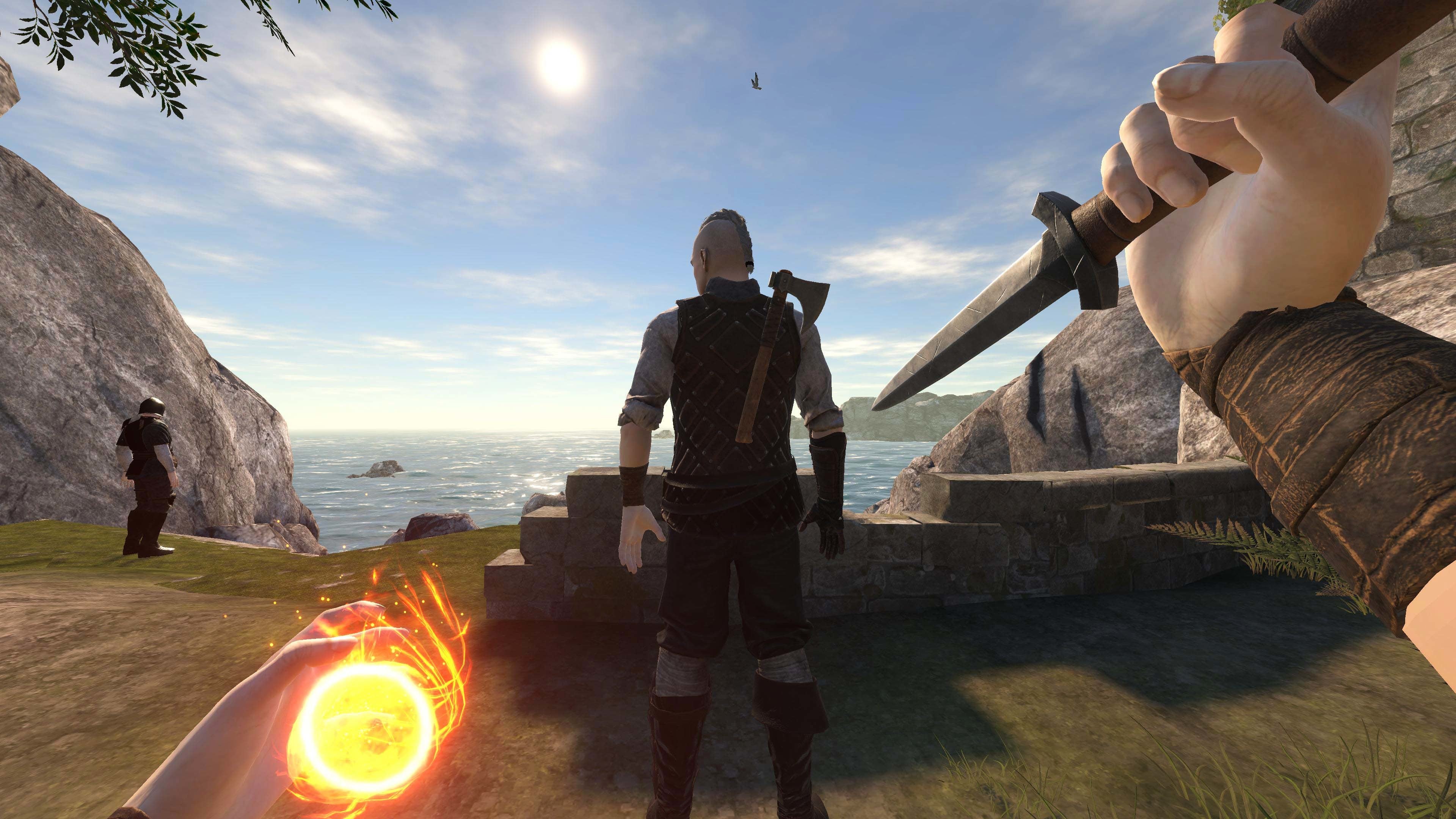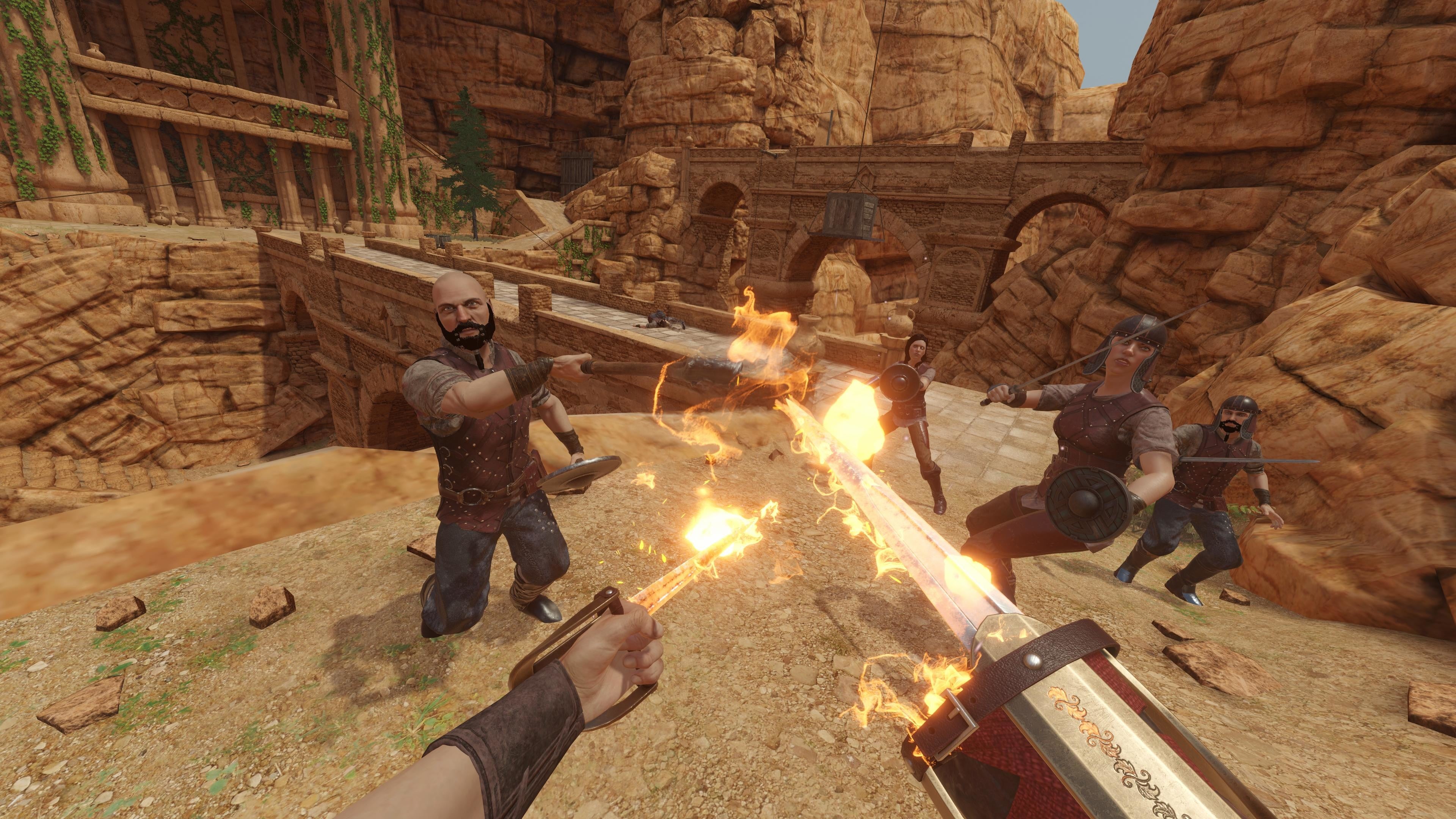Products You May Like
Between tax returns, terrible weather, and rank Tory corruption, 2023’s opening act has put me in a right foul mood. So foul, in fact, that I could quite happily kill something (in a game). I want to hack something to death, with sharp implements in some sort of virtual environment. Oh, what’s this hiding down the back of the sofa? Why, it’s Blade And Sorcery, a VR game about hacking people to death in a virtual environment. How fortunate!
In fairness to Blade And Sorcery, it isn’t just about hacking people to death. It’s also about beating them to death, burning them to death, shocking them to death, and tossing them over conveniently-placed precipices. To death. Structurally it’s akin to BoneLab, less a cohesive game and more a sandbox with gamey bits dangling off. But it’s far more focussed than Stress Level Zero’s surreal VR sim, with all its systems dedicated to fantasy-infused gladiatorial combat.
Blade And Sorcery takes advantage of VR’s highly analogue control scheme to put deadly weapons directly in your hands, in this case swords, axes, spears, mauls, staves, and so forth. You then fight enemies in various arenas by aggressively waggling the sharp end at them, trying not to whack your knuckles on any nearby furniture in the process.
It’s hardly the only game to do this. Swords and VR go together like economic inflation and mass industrial action. But Blade And Sorcery literally hits different. Through detailed physics simulation and acute audio-visual feedback, the resulting fighting system is incredibly tangible. You can almost feel the blades clashing as you strike out at an opponent, sparks flying as your foe stumbles back from the force of your attack. And when your sword whizzes past their guard and sinks into their flesh, it really does sink, to the point where pulling it free requires actual effort.
When your sword sinks into their flesh, it really does sink, to the point where pulling it free requires actual effort
Much like the Walking Dead: Saints And Sinners, this gruesome tactility is a big part of Blade and Sorcery’s appeal. Here though, you’re not piercing the braincases of cel-shaded zombies, you’re swinging chunks of metal into mannequin-like human warriors. And it’s a mercy their eyes are lifeless to start with, because the first time you slide a length of steel into their belly is deeply disconcerting, even for a grizzled veteran of videogame warfare like myself. You can even use your free hand to grip your foe as you shank them, like Russell Crowe seeing off Joaquin Phoenix at the end of Gladiator.
But there’s more to this depiction of how blades interact with bodies than simple depravity. That same granularity is applied to every material in Blade And Sorcery. If your opponent is wearing armour, it will offer localised protection from your blows, even if it’s just a patch of leather on one side of their chest. Once you grow tired of eviscerating half-naked gladiators and start fighting enemies with helmets and shields, duels become more tactical affairs. You’ll have to actively probe for weaknesses in your enemy’s defence, while safely blocking and evading their own strikes.
The intricate simulation also means fights are wonderfully scrappy. The times you’ll defeat an enemy with a perfectly executed swing are rare. Most of your attacks will result in a glancing blow, an outright miss, or clumsily slapping them with the flat of your blade. If you’ve ever enjoyed the fluid, organic combat of Raven Software’s Jedi Knight games, Blade And Sorcery’s duels have a similar quality, only without the lightsabers.


And all this only refers to the “Blade” bit of Blade And Sorcery. You can also use weave spells into your fighting style. Magic revolves around three basic abilities – fire, electricity, and gravity – but each can be applied in different ways. You can throw a small fireball with one hand, for example, or use both hands to cast a much more powerful incendiary attack. Magic effects can also be applied to weapons, making your sword that much nastier by adding burn damage, and so forth. On top of all this is an extremely generous bullet-time (should that be arrow-time?) ability, which both makes combat easier and lets you admire your horrible handiwork in gruesome detail.
When it comes together, Blade And Sorcery essentially becomes a VR Dark Messiah: Might and Magic, sharing the physicality and capacity for silliness of Arkane’s underrated fantasy adventure. Yes, you can impale enemies on your longsword and watch their corpse slide down your blade, but you can also kick them into spike walls, knock them over by throwing clay pots at them, or kite them around the map until they stumble into one another. Blade And Sorcery’s secondary mechanics further facilitate Hollywood-style swashbuckling, with the game including a climbing system and the ability to slide down ropes and ziplines.
The big difference (apart from the VR anyway) is that Dark Messiah offers a properly structured adventure. Blade And Sorcery is an Early Access project developed largely by one person, and most of the last five years has gone into expanding and refining the combat system. How you use those tools to create entertainment is up to you. You choose your map, choose your weapon, select the number and difficulty of enemies you want to fight, and then kill until bored.

At least, that was the case until recently. Last year, developer WarpFrog added a new map – the Outpost. Unlike the existing roster of arenas, the Outpost is a large, linear environment with enemies scattered through the map rather than spawning in waves. Here, Blade And Sorcery really does feel like Dark Messiah, as you explore a crumbling, vertiginous fortress, battling along salty clifftops and booting mages down staircases. It’s a fantastic space to explore, even if it’s still largely devoid of context.
And it’s important to bear in mind that Blade And Sorcery still isn’t finished. The next update will add breakable objects and substantially expand the Outpost map, while future plans include a more progression-based “Crystal Hunt” mode. Oh, and it should be mentioned that Blade And Sorcery has one of the more active VR modding communities, with mods that add crossbows, flintlock pistols, and, of course, lightsabers.
As a vehicle for catharsis, Blade And Sorcery is almost too good, making me wonder if I should turn myself in at the nearest police station. But it’s also capable of producing the kind of open-ended action sequences I associate with my favourite games. I’d like to see more structured scenarios in the vein of the Outpost, but even when you’re forced to make your own fun, this isn’t exactly hard to do.
